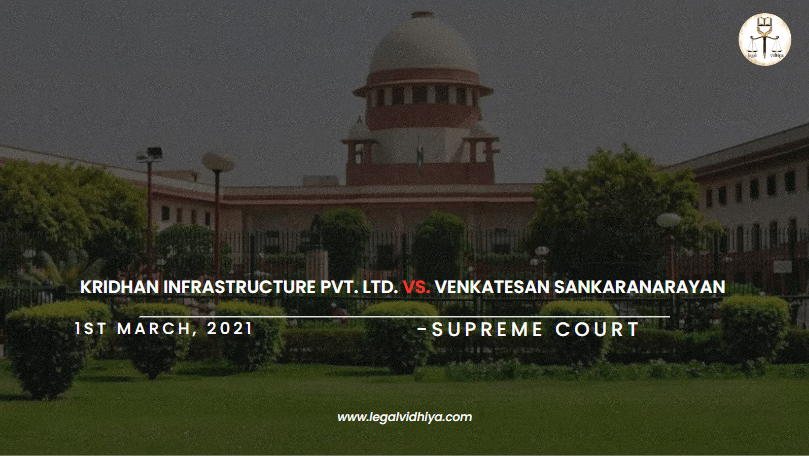
| CITATION | 2021 SCC ONLINE SC 129 |
| DATE OF JUDGEMENT | 1st March, 2021 |
| COURT | Supreme Court of India |
| APPELLANT | Kridhan infrastructure pvt. Ltd. |
| RESPONDENT | Venkatesan Sankaranarayan & Ors. |
| BENCH | D.Y. Chandrachud M.R. Shah, JJ. |
INTRODUCTION
This case involves an appeal against an order issued by the National Company Law Appellate Tribunal (NCLAT) on 8 September 2020. The appellant, who had submitted a Resolution Plan for Tecpro Systems Limited, challenged the order which led to the company’s liquidation under the Corporate Insolvency Resolution Process (CIRP) as per the Insolvency and Bankruptcy Code (IBC) 2016. The case raises significant questions regarding the implementation of Resolution Plans and the consequences of non-compliance under the IBC framework.
FACTS OF THE CASE
- The appellant submitted a Resolution Plan for Tecpro Systems Limited, a company undergoing CIRP. The Committee of Creditors (CoC) approved the plan on 8 March 2019 with an 89.92% majority. The National Company Law Tribunal (NCLT) subsequently approved the plan on 15 May 2019, leading the appellant to deposit Rs 5 Crores in an escrow account as an initial step.
- Despite the initial deposit, the appellant failed to meet further obligations outlined in the Resolution Plan, including the required equity infusion. This failure persisted over a six-month period, despite several opportunities to comply. As a result, on 11 November 2019, the CoC voted with a 99.28% majority to liquidate Tecpro Systems Limited, citing the appellant’s non-compliance.
- The NCLT ordered the liquidation of the company on 16 January 2020. The appellant’s appeal to the NCLAT was dismissed, affirming the NCLT’s liquidation order.
- On 9 October 2020, the Supreme Court granted interim relief to the appellant, allowing an opportunity to deposit Rs 50 crores by 10 January 2021. Despite an extension until 25 February 2021, the appellant failed to make the deposit, leading to further complications.
ISSUES RAISED
- Whether the appellant’s failure to comply with the Resolution Plan justified the liquidation of Tecpro Systems Limited?
- Whether the appellant should be granted additional time or relief to implement the Resolution Plan and avoid liquidation?
CONTENTIONS OF THE APPELLANT
The appellant argued that liquidation should be a last resort and demonstrated a willingness to comply with the Resolution Plan’s terms, including depositing the required Rs 50 crores. The appellant claimed that securing financing from Term Lenders was contingent on changing Tecpro Systems Limited’s status from “under liquidation” to “active”. The appellant asserted that this status change was crucial for raising the necessary funds. Edelweiss Asset Reconstruction Company Limited (EARC), a major financial creditor, supported the appellant’s efforts, stating that allowing the appellant to implement the Resolution Plan aligned with the commercial decisions and best interests of the creditors.
CONTENTIONS OF THE RESPONDENT (LIQUIDATOR)
The liquidator argued that the appellant had consistently failed to comply with the terms of the Resolution Plan despite multiple extensions and opportunities, thereby justifying the liquidation order. The liquidator opposed granting any further extensions, emphasizing that the appellant had been unable to raise the necessary funds and meet its obligations, which would further delay the resolution process and undermine the objectives of the IBC.
JUDGMENT
The Supreme Court dismissed the appeal, emphasizing that the appellant had not demonstrated the ability to implement the Resolution Plan despite ample opportunities. The Court ordered the forfeiture of Rs 20 crores already deposited by the appellant and directed that the management revert to the liquidator to proceed with liquidation in accordance with the law.
ANALYSIS
The Court stressed the critical importance of adhering to timelines in the CIRP under the IBC. The appellant’s repeated failures and delays were seen as undermining the statute’s objective of timely resolution of insolvencies. The IBC aims to ensure a swift and effective process, and any deviation from this timeline can affect the interests of creditors and the overall economy. The appellant’s inability to meet the financial commitments, despite extensions and opportunities, indicated a lack of bona fides. The Court highlighted the need for fairness and good faith in dealings within the insolvency process. The appellant’s failure to deposit the Rs 50 crores even after being granted extensions was a critical factor in the decision. While the IBC prioritizes resolving corporate insolvencies over liquidation, liquidation is warranted when resolution applicants fail to meet their obligations. The Court’s decision balanced the creditors’ interests and the broader public interest in maintaining the integrity and efficiency of the insolvency resolution process.
CONCLUSION
The Supreme Court’s decision underscores the essential nature of strict adherence to the terms of Resolution Plans within the CIRP framework. It affirms that while liquidation is a measure of last resort, it becomes necessary when resolution applicants fail to comply with their obligations. This case reinforces the IBC’s objective of ensuring timely and effective resolution of corporate insolvencies, thereby protecting the interests of creditors and maintaining the integrity of the insolvency process. The judgment serves as a cautionary tale for future resolution applicants about the importance of fulfilling their commitments to avoid severe consequences like liquidation.
REFERENCES
1. https://main.sci.gov.in/supremecourt/2020/20280/20280_2020_36_1_26554_Judgement_01-Mar-2021.pdf
2. https://indiankanoon.org/doc/157906842/
This article is written by Riya Singla, student of Himachal Pradesh National Law University, Shimla (HPNLU); Intern at Legal Vidhiya.
Disclaimer: The materials provided herein are intended solely for informational purposes. Accessing or using the site or the materials does not establish an attorney-client relationship. The information presented on this site is not to be construed as legal or professional advice, and it should not be relied upon for such purposes or used as a substitute for advice from a licensed attorney in your state. Additionally, the viewpoint presented by the author is of a personal nature.




0 Comments